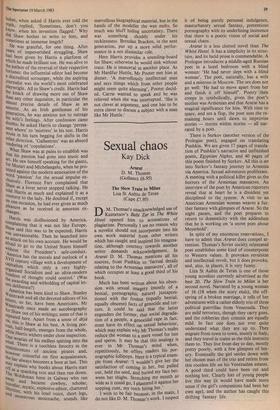Sexual chaos
Kay Dick
D. M. Thomas's unacknowledged use of Kuznetsov's Babi Zar in The White Hotel opened him to accusations of plagiarism. Personally I see no reason why a novelist should not incorporate into his own work material from other writers which has caught and inspired his imagina- tion, although courtesy towards another writer demands acknowledgement. In Ararat D. M. Thomas mentions all his sources, from Pushkin to 'factual details relating to the Armenian massacres', all of which occupies at least a good third of his book.
Much has been written about his obses- sion with sexual imagery (mostly of a bestial, pornographic nature) juxtaposi- tioned with the foulest (equally bestial, equally obscene) facts of genocide and tor- ture. It could be said that the latter engenders the former, that social degrada- tion of a people, a genocidal rape in fact, must have its effect on sexual behaviour, which may explain why Mr Thomas's males reduce the woman to a mere vessel for lust and sperm. It may be that this analogy is ever in Mr Thomas's mind when, repetitiously, he offers readers his por- nographic lollipops. Here is a typical exam- ple from Ararat: 'I wouldn't give her the satisfaction of coming in her, but pulled out, held the seed, and buried my face bet- ween her thighs. Stretching m wide as it could go, I plasteredity against m o u t h her a s sopping cunt, my teeth biting her.'
I wish to be fair because, in the main, I do not like D. M. Thomas's work. I suspect it of being purely personal indulgence, masturbatory sexual fantasy, pretentious pornography with its underlining insistence that there is a poetic vision of social and sexual chaos.
Ararat is a less clotted novel than The White Hotel. It has a simplicity in its struc-
ture, and its lucid prose is commendable. A Prologue introduces a middle-aged Russian poet in a hotel bedroom with a blind woman: 'He had never slept with a blind woman'. The poet, naturally, has a wife and a mistress in Moscow. The sex does not go well: 'He had to move apart from her and finish it off himself'. Poetry then creeps in symbolically, given the poet's mother was Armenian and that Ararat has a magical significance for him. With time to spare, and sex a flop, the poet uses the re- maining hours until dawn to improvise stories — stories within stories — all nar- rated by a poet.
There is Surkov (another version of the Prologue poet), engaged on translating Pushkin. We are given 17 pages of transla-
tion of Pushkin's narrative and unfinished poem, Egyptian Nights, and 40 pages of
this poem finished by Surkov. All this is set into Surkov's fantasy journey to Armenia via America. Sexual adventures proliferate.
A meeting with a political killer gives us the horrors of the Armenian massacres. An interview of the poet by American reporters reveal that at heart he is a dissident yet disciplined to the system. A visit to an American Armenian woman weaves a fur- ther fantasy with glimpses of Ararat. So the night passes, and the poet prepares to return to domesticity with the addendum that he is working on 'a secret poet about Meyerhold'.
In spite of my enormous reservations,
have to admit that Ararat does compel at- tention. Thomas's Soviet society orientated
poet establishes some kind of counterpoint to Western values. It provokes revulsion and intellectual revolt, but it does provoke, and, also, in places, it is very funny.
Liza St Aubin de Teran is one of those young novelists currently advertised as the
best 20. The Slow Train to Milan is her
second novel. Narrated by a young woman of 16 (18 when the story ends), the off- spring of a broken marriage, it tells of her adventures with a rather elderly trio of three political guerrillas from Venezuela. They are mild terrorists, though they carry guns, and the robberies they commit are equally mild. In fact one does not ever quite understand what they are up to. They migrate from town to town, mostly in Italy, and they travel in trains as the title instructs them to. They live from day to day, mostly pretty poorly, with a few glimpses of lux- ury. Eventually the girl settles down with her chosen man of the trio and retires from this rootless life on his Venezuelan estates. A good third could have been cut and nothing lost. Clearly lots of young people live this way (it would have made more sense if the girl's companions had been her own age), and the author has caught this drifting fantasy life.










































 Previous page
Previous page